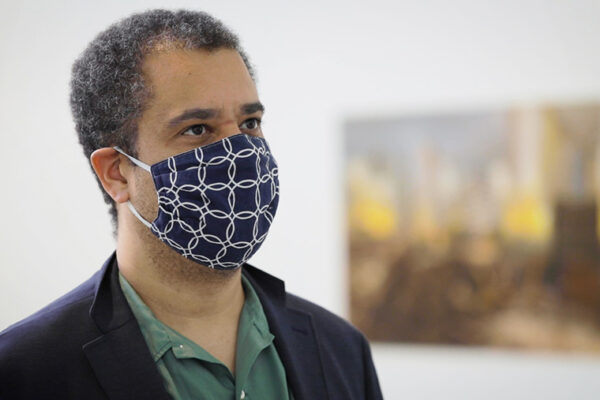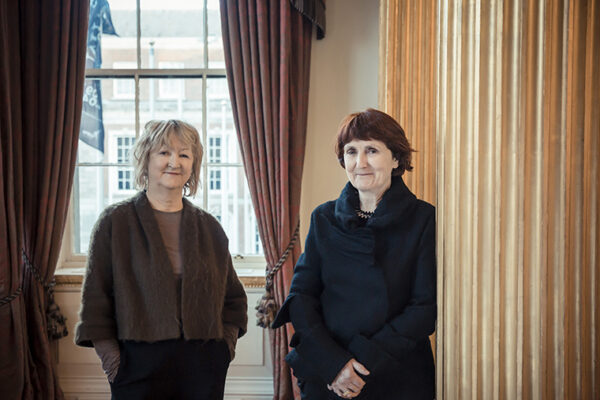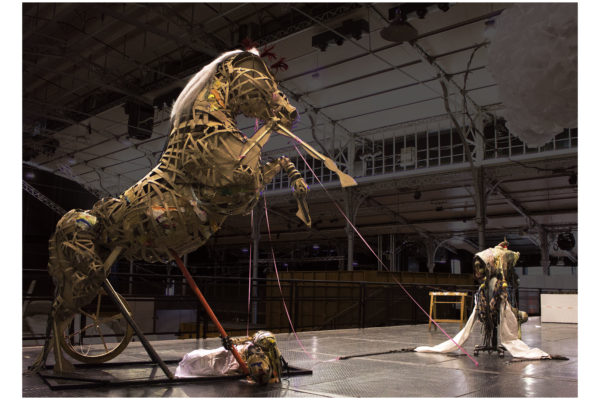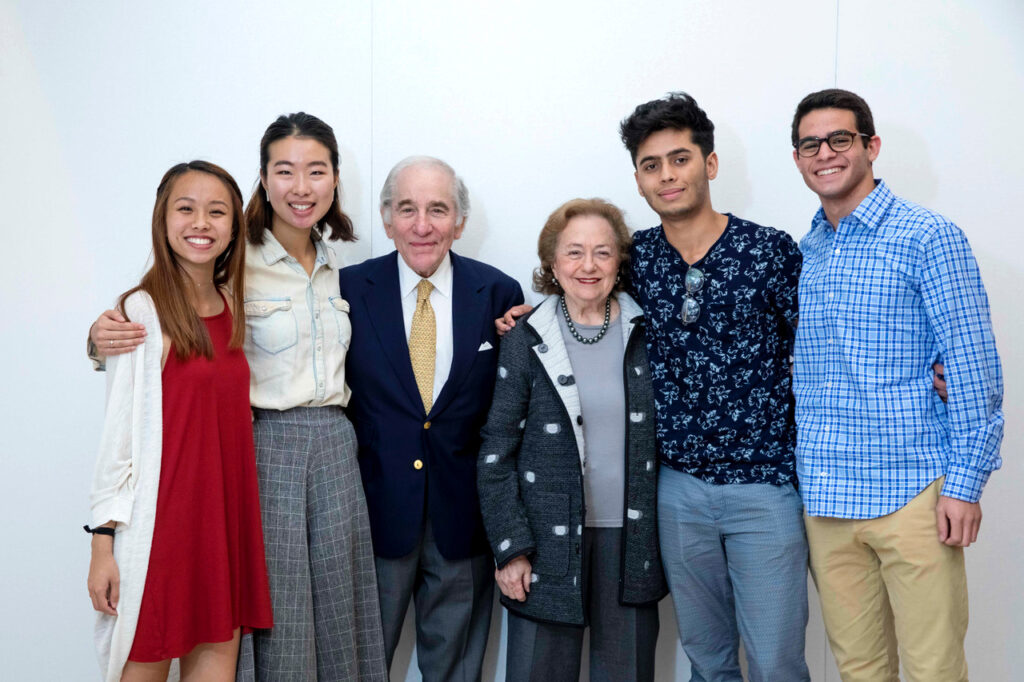
Since its founding in 2006, the Sam Fox School of Design & Visual Arts at Washington University in St. Louis has established a national reputation for addressing critical social and environmental challenges. Innovative programs, curricula and collaborative initiatives have driven substantial growth in graduate enrollment and in the school’s campus footprint — both of which have roughly doubled in size.
Now the Sam Fox School is launching a new scholarship program designed to enhance recruitment and interdisciplinary exchange across its graduate degree programs.
The Sam Fox Ambassadors Graduate Fellowship Program, which will welcome its inaugural class in fall 2020, will provide full-tuition waivers and accompanying travel stipends, as well as unique academic and professional opportunities, for 10 applicants each year, across the following graduate degree programs:
- Master of Architecture
- Master of Fine Arts in Illustration & Visual Culture
- Master of Fine Arts in Visual Art
- Master of Landscape Architecture
- Master of Urban Design
“Washington University is extremely grateful to Sam Fox, in whose honor both the Sam Fox School and the Sam Fox Ambassadors program are named,” Chancellor Andrew D. Martin said. “Sam and his wife, Marilyn, are both prominent civic leaders who’ve played major roles at many of St. Louis’ most important cultural institutions. Their vision and devotion to excellence are inspirations to us all.”
“Over the last two decades, Sam and Marilyn have made extraordinary commitments to undergraduate scholarships,” added Carmon Colangelo, the Ralph J. Nagel Dean of the Sam Fox School and the E. Desmond Lee Professor for Collaboration in the Arts. “They are now building on that generosity with a major gift to strengthen graduate recruitment. The Ambassadors program will support top art and architecture students from across the United States while also enabling us to expand international recruitment efforts.
“We are deeply in their debt.”
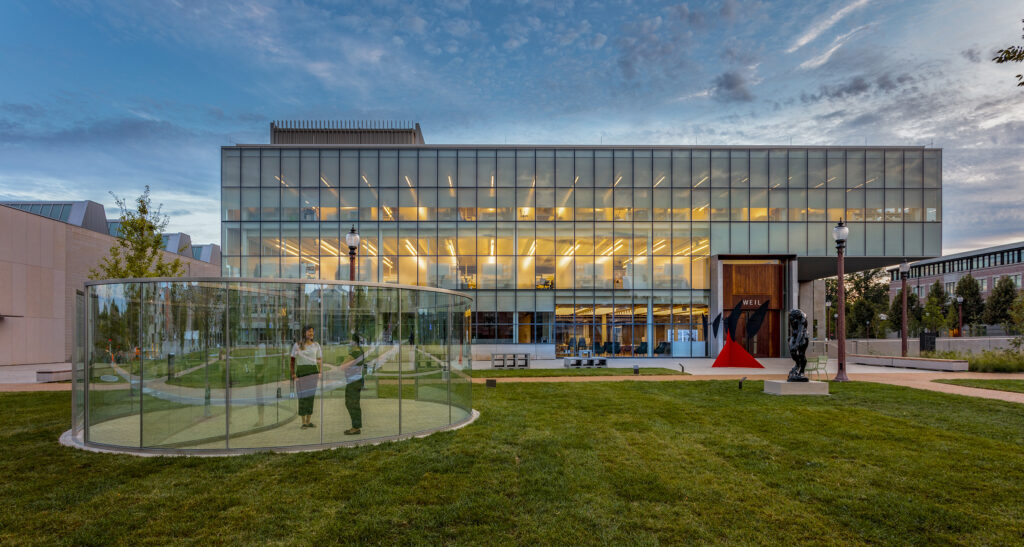
Building the Sam Fox School
Fox, a former U.S. ambassador to the Kingdom of Belgium, is a 1951 graduate of Washington University and founder of Harbour Group Ltd., which specializes in acquiring and developing companies for long-term investment.
A lifetime voting member of Washington University’s Board of Trustees, Fox is a past president of the Saint Louis Art Museum’s Board of Commissioners and has served on the boards of Barnes-Jewish Hospital, Opera Theatre of St. Louis, the Saint Louis Science Center and the Saint Louis Zoo, among others. From 1998-2004, he chaired the public phase of the Campaign for Washington University, which raised more than $1.5 billion in gifts and commitments, including $60 million to improve campus arts facilities.
“Every artist, every designer, every architect is in some ways an entrepreneur,” Fox said. “They’re working to create something new. This takes vision, and patience, and persistence. It also takes a certain amount of community support. Washington University has helped generations of students — myself very much included — find their own paths to success. If you really want to shape the future, there is no better investment than education.”
In 2006, the university established the Sam Fox School by uniting three existing campus areas, each boasting a rich individual history. The College of Art, founded in 1879, was the first professional, university-affiliated art school in the United States. The College of Architecture, founded in 1910, was among 10 founding members of the Association of Collegiate Schools of Architecture. The Mildred Lane Kemper Art Museum dates back to 1881 and was the first art museum west of the Mississippi River.
“In many ways, Sam’s commitment in naming the school was a strong first step toward creating a larger and more unified Sam Fox School complex,” Colangelo said. “It was also a powerful indicator of what could be achieved across the university’s east end.”
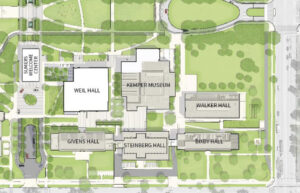
Colangelo pointed out that when the Sam Fox School opened, its three historic structures — Bixby, Givens and Steinberg halls — were joined by a new building for the Kemper Art Museum and by Earl E. and Myrtle E. Walker Hall (both 2006). More recently, the east end project, which the university dedicated this fall, included the Sam Fox School’s new Anabeth and John Weil Hall; a museum expansion; the new Ann and Andrew Tisch Park; a 792-car underground garage; and other facilities.
“Today, the Sam Fox School stretches across six major buildings, with the Kemper Art Museum prominently positioned as the university’s public ‘front door,’” Colangelo said. “None of that would have been possible without Sam’s steadfast commitment to the school and his consistent encouragement to help us realize our vision to be among the very best places in the world for art and design education.”
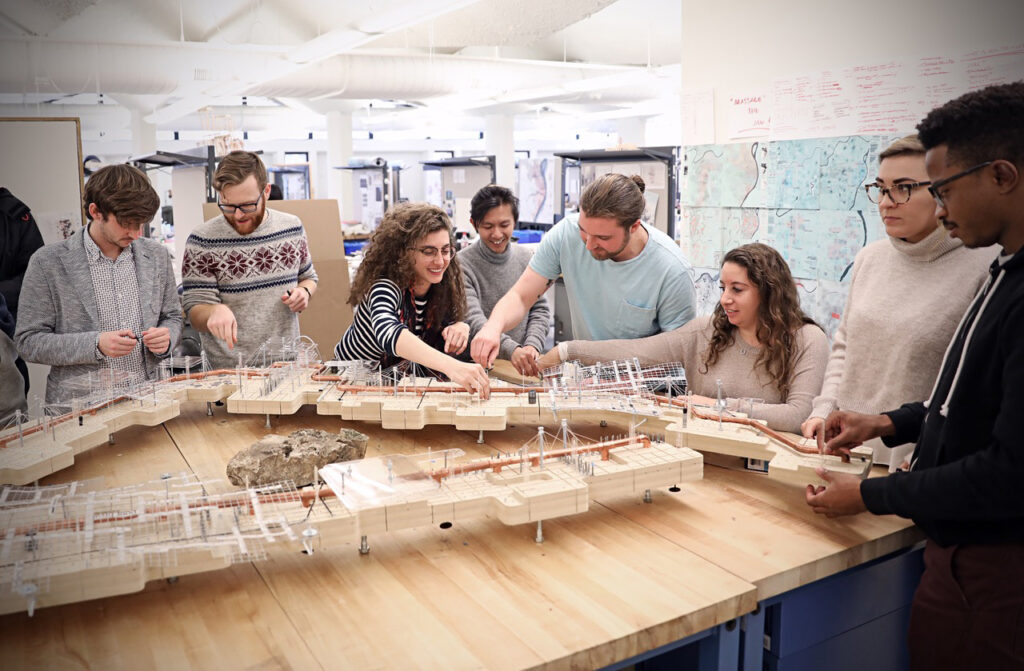
Recruiting top students
Today, the Sam Fox School includes more than 800 graduate and undergraduate students, as well as 70 full-time faculty and 50 visiting and part-time faculty, across 15 degree programs. These include the new MFA in Illustration & Visual Culture and a wide range of dual and joint degrees combining architecture with business administration, computer science and engineering, construction management, landscape architecture, social work and urban design.
Supplementing the formal degree programs are a number of creative research initiatives, such as Island Press, the Center for Health Research & Design and the Office for Socially Engaged Practice. Other academic opportunities range from the Fox Fridays workshop series to The Divided City initiative, the Kemper Art Museum’s Teaching Gallery and the minor in human-computer interaction.
“Today’s most urgent problems often require interdisciplinary solutions,” said Heather Woofter, the Sam and Marilyn Fox Professor and director of the College of Architecture and Graduate School of Architecture & Urban Design. “You can’t talk about housing without talking about families. You can’t talk about infrastructure without talking about segregation. You can’t talk about landscape design without talking about sustainability.
“The Sam Fox Ambassadors Program will help us to better recruit top students to our professional degree programs,” Woofter continued. “But just as importantly, it will allow us to recruit students from a wider array of socioeconomic backgrounds, representing a more diverse set of perspectives and life experiences. We’re so grateful to Sam for establishing this program.”
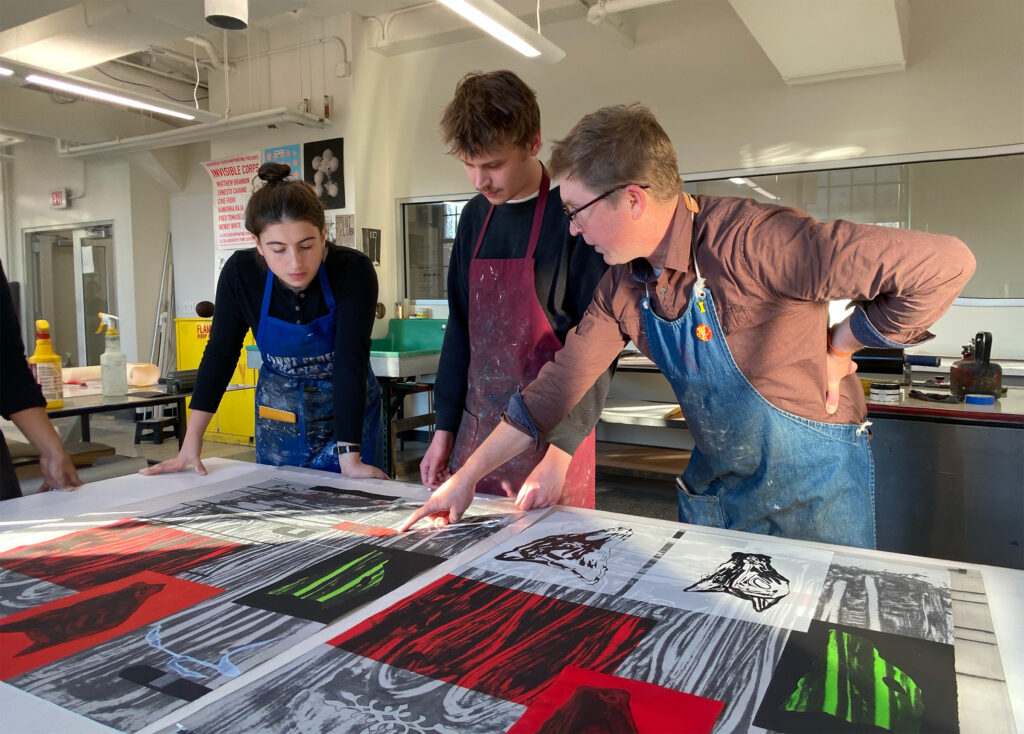
In many ways, Weil Hall, which was designed by KieranTimberlake, serves as the physical embodiment of that collaborative spirit. The 82,000-square-foot building intermingles the full range of graduate art and architecture programs on every floor, while also placing students in greater proximity to the Kemper Art Museum and peers in social work, engineering and environmental studies.
“Art-making is a way of understanding and orienting oneself in the world,” said Amy Hauft, the Jane Reuter Hitzeman and Herbert F. Hitzeman, Jr. Professor of Art and director of the College and Graduate School of Art. “It’s a way of understanding the built environment. We’re influenced by our surroundings and by the people we see every day, aesthetically, physically and sociologically.
“In the Sam Fox School, young artists and designers from across the nation pursue their individual interests while also being part of a world-renowned research institution,” Hauft added. “That’s both inspiring and a crucible of sorts. It means one’s subject matter in the studio can be informed by art professors as well as philosophy professors, by design professors and computer engineers. This environment will challenge you to explore, discover and articulate your own place in the world.”
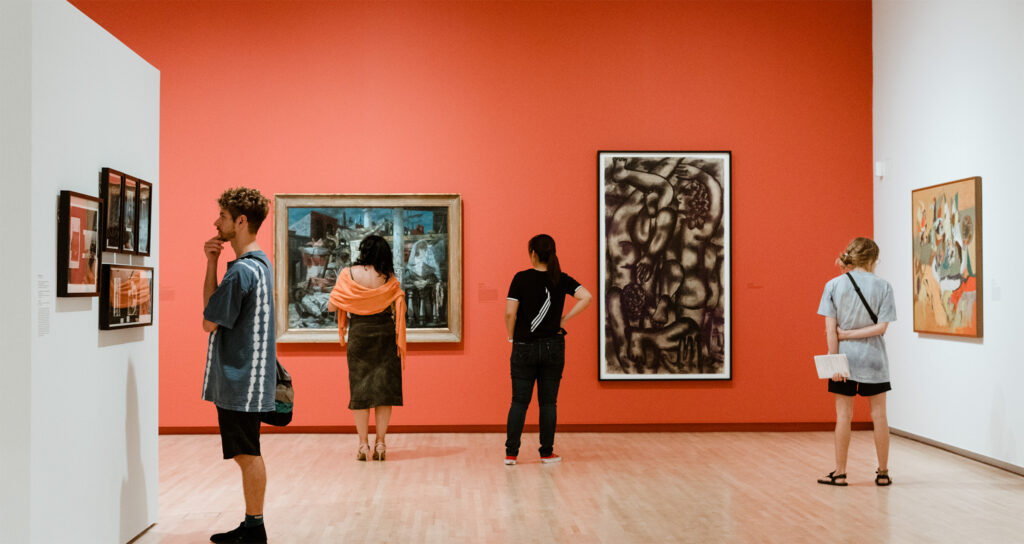
Sam Fox Ambassadors
The Sam Fox Ambassadors program is supported by the Sam and Marilyn Fox Foundation. Each fellow will receive a full-tuition scholarship, as well as a travel stipend to support individual research or school-related travel. Ambassadors also will participate in a series of events each year designed to advance their creative work and scholarship.
All graduate applicants to Sam Fox School will be considered for the Ambassadors program; no separate application is required. Finalists will be asked to participate in a remote interview with Sam Fox School faculty. Recipients will receive notification of selection in conjunction with their admission and financial aid information in early March.
Applications for the Master of Architecture, Master of Landscape Architecture and Master of Urban Design programs are due Jan. 15. Applications for the Master of Fine Arts in Visual Art and Master of Fine Arts in Illustration & Visual Culture programs are due Feb. 3.
For more information, visit https://samfoxschool.wustl.edu/ambassadors.
